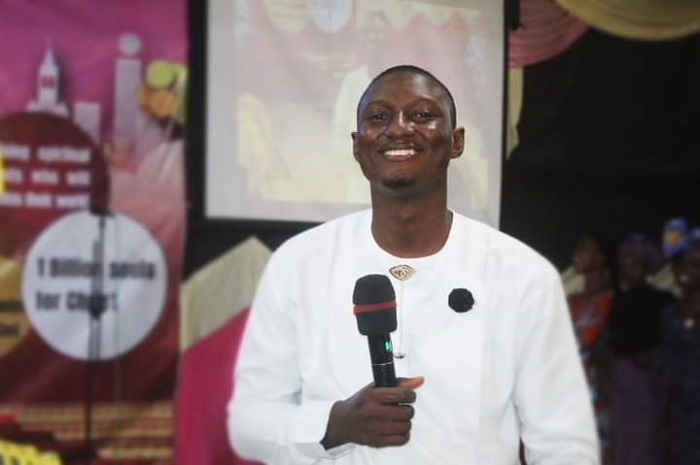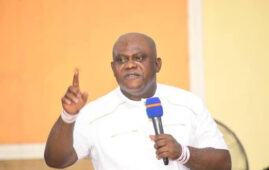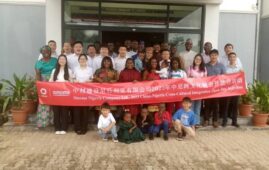



It was shortly before noon on Friday, September 2, 2016. As an unrelenting downpour fell on D-Line, an urban residential area of Port Harcourt, the capital of Rivers State, Joy (original name withheld) sought shelter in a nearby church while her boyfriend paid the cab driver. Then they entered a nondescript, unfinished one-storey building.
Joy was 17 and enrolled in a university pre-degree programme. After she fell pregnant, her boyfriend, a 29-year-old medical laboratory science graduate, had taken her to the building to see a doctor who ran a private, unregistered clinic. She did not want to be there.
“I was still a kid, just 17.” I did not know anything about my body. “I was more or less a child,” Joy explained, her voice strained as she mined her memory for details.
The building was on a side street just off a main road and had shops on either side of it. The downpour had emptied the street, but for one roadside seller who still managed to display her snacks. Inside, a four-room apartment was used as a makeshift clinic. The interior walls were mildewed and stained, and the white paint had almost completely chipped away.
Joy met three other women in the waiting room; they were also there to see the male doctor, who ran the place with two female nurses. One nurse briefly conferred with the doctor before Joy was called into the room they used as a theater.
The procedure—a surgical abortion—would cost her boyfriend 7,000 naira.
Inside the theater, there was a brown leather gurney positioned diagonally. A wooden cabinet was mounted above it, and nearby stood a trolley with metal pans.
Just 20 minutes after Joy walked into the room, the procedure was over. “I was just whisked into a room,” she recalled, exasperated. “I was not given any pre-abortion [treatment] nor any post-abortion treatment.”
“We got into business right on, immediately… There was this stuff that was like a really big injection, like a really big syringe. Instead of attaching a needle like a normal injection, the doctor attached a very big metal object. I will liken it to six or seven TV (whip) antennas joined together—that is how long and how big it was.
“Immediately, he started sucking, and I felt a pain I had not experienced before.” It was so, so bad. At a point, I had to tell him to please pull it out of me. I told him, “Please, please, please.” “I was writhing in pain, but at the same time I could not move because I did not want to harm myself by shaking.”
When the procedure was finished, a nurse helped Joy into the recovery room; then, minutes later, she was told to vacate the space because another patient needed it.
That was a dilation and curettage (commonly called D&C) procedure, an abortion method that is very unsafe but commonly used as an undercover method of pregnancy termination in Nigeria.
Worried by Joy’s experience—the harm this teenage girl had gone through in the hands of these gullible life terminators, not minding the law on the ground—this reporter wonders: How many more of these underground abortion service providers are out there still operating death traps under the guise of medical practitioners? In her curiosity, she carried out an undercover investigation to determine the compliance of medical health facilities in Abuja to the abortion law in Nigeria. As preliminary findings show, pregnancy terminations are quite common, and because they are often performed clandestinely or by unskilled providers, most are unsafe.
The first national study to examine the incidence of abortion estimated that in 1996, about 610,000 abortions, or 25 per 1,000 women aged 15–44, occurred in Nigeria. A decade later, another study noted that if the abortion rate had not changed since 1996, then 760,000 abortions would have occurred in 2006 and 2,100,000 in 2021, given the increase in Nigeria’s population during this period.
This report is an undercover investigation of a hospital, clinic, pharmacies, and drug stores in several Abuja neighborhoods. Other random interviews with religious leaders and a medical expert were carried out to add their voices to the story.
Under the guise of a pregnant young woman who does not want to keep the pregnancy, this reporter visited two pharmacies, two patent stores, one clinic and a hospital.
She tells the story
At a Pharmacy located in Kuje, I was attended to by a female pharmacist. I informed her I had come to get assistance in ending an unwanted pregnancy. When she questioned the term of the pregnancy, I responded that the pregnancy was two (2) weeks. She asserted that it is better that the pregnancy was detected early because it avoids the need for surgery (D&C). I will only need a D&C if the pregnancy is six (6) weeks or longer, noting that it will be riskier at that point.
She explains that at this point, all I’ll need is a medication that will be placed beneath my tongue. And I’ll miscarry; the loss of the pregnancy will occur in a manner similar to my menstrual flow. She continued by saying that although the medication is now on hand in the pharmacy, she is unable to offer it to me without a prescription from a doctor affiliated with a public or private hospital or clinic.
I told her that I had visited a doctor who refused to write me a prescription because the pregnancy wasn’t life-threatening. She inquired about the doctor being Muslim, and I answered yes. She remarked, “Oh, she gets it; that’s how they do.” She then suggested I tell any of my doctor friends about my situation so they could write me a prescription. I would then go back and obtain the drug because the procedure needed to be handled promptly. She says even if I decide to visit other pharmacies, I’ll be told the same thing; however, if I find any pharmacy willing to sell to me without a doctor’s report, I’ll be charged heavily above the usual price of the drug.
At another Pharmacy in Kuje
I met a female pharmacist who dressed in Islamic fashion. I told her to advise me on how to get rid of an unwanted pregnancy. In her opinion, keeping it is the safest course of action. However, there’s the option of taking pills, which she would not advise me to do unless I had a doctor’s prescription.
She continued by saying that married women who became pregnant unintentionally, as well as single women, also approached the drugstore about getting an abortion, but the pharmacy remained stringent about requiring a prescription from a doctor.
She described a situation that happened the week before in which a lady who already had a fragile child and was still nursing it became pregnant and wanted to discontinue the pregnancy so she could have time for both her baby and her job.
The MD of the pharmacy, however, refused to perform the procedure on the patient. I requested the drug’s name so that, even if she doesn’t sell it to me, I could get it elsewhere. She refused, stating that doing so would be dangerous. The pharmacy would be held responsible if anything went wrong, which explains why they would ask for a doctor’s prescription.
At a Medicine Store, Kubwa
I met a male drug seller. I explained to him that I was there to end an unwanted pregnancy, and he suggested I go to a hospital and explain to a doctor. Instead of going to a pharmacy, I could then have a safe abortion treatment. He continued by saying that if everything doesn’t go as planned, the procedure will be extremely risky because four out of every ten abortions end in complications of some kind.
At a Chemist in Kubwa
I met a male chemist. I gave him the reason for my visit—to end an unwanted pregnancy—as I explained to him. He informed me that although he does not do abortions, he could recommend someone who is extremely skilled in the procedure and who has successfully completed the procedure for previous women who wanted it with no reports of fatalities or major problems. In order to track my recuperation, he also said that the individual would enroll me in post-abortion treatment.
At a Hospital and Maternity in Lugbe
The male doctor (consultant) who was on duty at Abuja Unity Hospital and Maternity Lugbe attended to me. He responds that he would have been delighted to get me out of the issue, but that his line of work forbids it after hearing about my experience and the fact that I had gone to him for assistance in ending the unwanted pregnancy. He told me unequivocally that abortion is illegal in Nigeria unless there is a threat to life, which is not the situation in my instance. He urged me to keep the child because many women want but are unable to have such a blessing. He also said that after I gave birth, I may choose to take the child to an orphanage.
At a Clinic in Area 3- Garki
On duty was a female consultant. She inquired about the pregnancy term after I said that I had come for help in terminating an undesired pregnancy. I replied that it was four weeks. When she inquired whether I was a student, I said, “No, I’m a graduate and a working lady.” She enquired as to why I wanted to end the pregnancy. I told her that I was not yet prepared to become a parent, especially since I was still single. She then enquired as to whether the man who was responsible for the pregnancy was aware of it and whether he agreed with the abortion. “He is aware of the pregnancy and my plans to have it terminated.” I told her. She then advised me to return home, carefully weigh my alternatives, and come back in two days if I still desired to proceed.
The position of the law on abortion in Nigeria
Induced abortion is illegal in Nigeria except when performed to save a woman’s life. Both the penal code, which is generally applied in the country’s northern states, and the criminal code, which generally applies in the southern states, allow this exception, and both regions specify similar criminal penalties for noncompliance. Despite the fact that abortion is considered illegal in Nigeria, studies suggest noncompliance with the law. The 2003 Nigeria Demographic and Health Survey (NDHS) estimated that 12% of pregnancies in Nigeria end in abortion. A 12-year review of women who had undergone induced abortion in Ile-Ife, Nigeria, showed that 30% of the cases of mortality were aged between 15–20 years and 37% were students.
What a medical expert says
Medical expert Dr. Juliet Sabastine, who is based in Abuja, provided clarity on the abortion law. “First of all, abortion in Nigeria is not legal. So unlike in the US where if a lady finds out she is pregnant and doesn’t want to keep the child, she walks into any Clinic or health facility and say she’s wants to terminate the pregnancy, in Nigeria it’s not so because abortion is not legal.”
However, certain circumstances or situations, according to Dr. Juliet, demand or warrant abortion. “It’s in these instances that one can carry out abortion in Nigeria as a medical practitioner.” Notwithstanding the circumstances, “it is entirely the mother’s decision.” She emphasised.
“For instance, for women with heart conditions or who have breast cancer and want to start chemotherapy, carrying a child will be disastrous to their health; they may not be able to withstand it.” In a situation like this, as a health practitioner, you will advise them to opt for the termination of the pregnancy.
“When the fetus has abnormalities that are not compatible with life—chromosomal abnormalities, however, certain circumstances usually make this easier to discover early on. This means that even if the pregnancy is carried to term, the baby will still die because its condition is not compatible with life. or other abnormalities.
“Where a woman has what is called a missed abortion, the baby died in the womb and needs to come out.
“When a patient comes in with an incomplete abortion, the process has already been started elsewhere, and then it is rushed to the hospital. You can go ahead and complete the process as a health practitioner.
“If this decision is made, it is usually made right there in the hospital; the termination of the pregnancy is dependent on the age of the fetus.” If it is at a young age, we want what is known as a “medical abortion,” in which we give the woman drugs that cause the uterus to contract and the baby to be expelled. If the pregnancy is not so early, we have to do what is called a “surgical abortion,” in which we carry out manual vacuum aspiration. “This procedure is carried out in a very clean, aseptic environment to avoid infection, and then it is carried out by a well-trained professional.”
Consequences of abortion procedures done by unqualified persons
“Bleeding: if the process is not carried out properly, the woman can bleed, and the bleeding can lead to anemic heart failure, and they can eventually die if they are not attended to on time.
“If not carried out by a professional, the instruments used might be non-sterile, and this can lead to infection that can lead to sepsis, which can become overwhelming and lead to death.
“Sepsis that affects the uterus may lead to its being removed entirely.
“Pelvic inflammatory diseases (PID): after everything, the woman keeps having vaginal discharge that is on and off and needs to be treated. This will now lead to infertility.” Dr. Juliet explained.
Religious Leaders shared their views on abortion.
Pastor Cornelius Haruna, Senior Pastor, Hour of Restoration Ministries International, speaks.
Abortion is evil, declares Pastor Cornelius Haruna categorically. It is first and foremost a sin against God. It is also a sin against mankind.
He continues by explaining that since abortion involves murder, it is a transgression against God. “The fetus in the mother’s womb takes on a shape if you can conduct a thorough scan of the child there. It takes the shape of a human being, and at some point you could see eyes, hands, and legs. You see the child has a heart and breathing. So, what is called abortion is actually life termination and that is very wrong.” When asked what he would say about abortion within the confines of marriage, Where one or both partners do not want to keep the baby for various reasons, such as getting pregnant too soon while still nursing a nursing baby, or for professional reasons, etc.? Pastor Cornelius Haruna says, speaking from the perspective of a pastor, a child of God, and a son of God, abortion is wrong whether within or outside of marriage. He adds that “murder is murder.”
When asked if he believes that legalizing abortion in Nigeria so that women can access safe abortions will reduce the number of deaths and complications caused by destructive and unsafe abortion measures. Pastor Cornelius Haruna says, “Well, the question I’m going to ask is, “Who legalized what? If God did not legalize it, it is wrong.”
On a general note, Pastor Cornelius Haruna says his general counsel on the matter of abortion is this: “It is wrong, and we have to learn to tell ourselves the truth.” He added that we are living in a conformist generation now, where irrespective of the truth or moral standards, apart from even scriptural standards, people are just trying to bend everything to suit immoral lifestyles, indiscipline, corruption, filthiness, and bending everything. He asks those who say, “Oh, abortion is correct,” if their parents had aborted them, would they still be alive? Abortion is the willful, well-calculated destruction of a life that is in the womb.”
Mallam Muhammad Kabir Kangiwa, an Islamic cleric, says abortion is a punishable offense in Islam. It is considered murder when a woman has an abortion. He adds, “It is a life that we cannot create; why take it?” Furthermore, when Allah gives a life, the people are to celebrate it rather than destroy it, so abortion is wrong.
When asked what he would say about abortion within the confines of marriage, Where one or both partners do not want to keep the baby for various reasons, such as getting pregnant too soon while still nursing a nursing baby, or for professional reasons, etc.? Mallam Muhammad Kabir Kangiwa says, “As Muslims, we believe that every child is a gift from Allah and everyone should be given the right to live.” No matter the situation in which the pregnancy occurs, abortion is not an option. Allah knows why he let the child come at that time. We must learn to accept our fate. No situation, whether married or not, justifies abortion. “A couple should always be prepared to have as many children as Allah will allow them to have.”
When asked if he feels that legalizing abortion in Nigeria so that women can get safe abortions will lessen the number of deaths and problems caused by destructive and dangerous abortion methods, he stated that he does not. It should never be authorized, according to Mallam Muhammad Kabir Kangiwa. Islamic law would never condone the wrongful killing of another individual.
Mallam Muhammad Kabir Kangiwa adds, “Let us always endeavor to accomplish the maker’s bidding. The life you are about to end could be the solution to the world’s problems. Every unborn child deserves to live.”
While this investigation might have revealed how health facilities in Abuja are complying with Nigeria’s abortion law, it did not cover the rest of the country. But the importance of increasing measures to guarantee abortion legislation compliance as one step to reducing maternal mortality can’t be overstated.


OPM runs 29 free schools, two.


The fact remains that China’s use.


On Friday March 10, China’s parliament.


The people of Zarma/Zabarmawa are believed.


After the adoption of UNSCR 2250.
As part of countdown to successful.
Leave a Comment